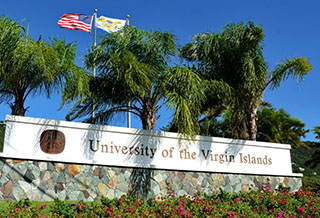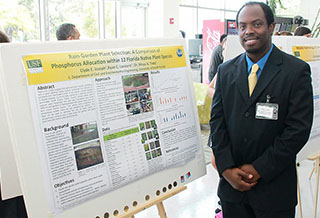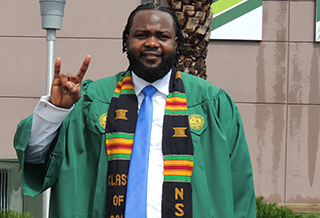Undergraduate
USF College of Engineering and University of the Virgin Islands (UVI) Articulation Agreement

The University of South Florida College of Engineering (USF COE) and University of the Virgin Islands (UVI) Articulation Agreement enables eligible UVI students to earn both their B.S. in Applied Mathematics from UVI, and a B.S. in Civil, Chemical, Computer, Electrical, Industrial, or Mechanical Engineering from USF. Students must complete degree requirements and engineering prerequisites at UVI (typically three years) prior to enrolling into an engineering department at USF. The USF engineering degree program is typically completed within three calendar years.
FAQs
1. What are the Transfer Requirements and Deadlines to be admitted into USF?
For UVI students with 60 or more credit hours a minimum transferrable GPA of 2.30
is required (except applicants with an AA degree from a Florida College System institution
and a minimum transferrable GPA of 2.00).
2. How do I gain admission to the College of Engineering?
a. Applicants must be admitted fully to the University of South Florida as a degree-seeking
student with 60 or more transferrable credit hours.
b. Students seeking acceptance under the UVI-USF COE Articulation Agreement are expected
to have both a 3.0 or higher overall GPA and a 3.0 math/science GPA.
c. Students must contact Mr. Bernard Batson no later than February 1 each year, and provide a letter of recommendation from the
UVI pre-engineering advisor that certifies eligibility for the UVI-USF COE program
based upon the above mentioned criteria (60 hours or more with 3.0 overall and science/math
GPA) prior to submitting the online application.
d. Applicants must have completed all of the following courses with a grade of C or
better (not C-) in each course (maximum two {2} attempts allowed to earn required
grade and a withdrawal is considered an attempt): Calculus I (MAC X281 or MAC X311
or equivalent), Calculus II (MAC X282 or MAC X312 or equivalent), and Calculus-based
Physics I with lab (PHY X048 or PHY X045 and PHY X048L or PHY X045L or equivalent).
Grades of W, I, IF, U, R and M are considered attempts. Attempts at past institutions
are included. Students who for any reasons fail to meet this requirements will be
ineligible to declare a major, or intended major in the College of Engineering, and
they will be ineligible to register for courses that are restricted to engineering
students.
e. Visit the College of Engineering admissions page for New Transfer Students here
for additional information.
f. You must be admitted to the department to be admitted to the College of Engineering,
except for applicants to the Information Technology degree program.


3. How do I gain admission to a specific Department (degree program) in the College
of Engineering?
a. Applicants must first be admitted into USF before applying to the program.
b. Each department (degree program) has separate GPA and prerequisite courses requirements
for students to be eligible for admission. Please review the information listed for
departmental requirements.
| USF Admission GPA Requirements | 2021/2022 Catalog Year | Subset of Prerequisite Courses in the Admissions GPA | |
|---|---|---|---|
| Biomedical Engineering | Please contact Cherine Chehab (cchehab@usf.edu) in the Department of Medical Engineering for admissions requirements. | ||
| Chemical Engineering | 2.0 | Calculus I, II, III; Physics I, II; Chemistry I | A grade point average of 2.0 or higher in Calculus, Physics and Chemistry guarantees Progression to the Upper Division. |
| Civil Engineering | 3.0 | Calculus I, II, III; Physics I, II; Chemistry I | A grade point average of 3.0 or higher in Calculus, Physics and Chemistry guarantees Progression to the Upper Division. |
| Computer Science | 3.5 | Calculus I, II; Physics I, and Lab | A grade point average of 3.5 or higher in Calculus and Physics guarantees Progression to the Upper Division. In addition, Completion of COP 2510 Programming Concepts with a minimum grade of “B” |
| Electrical Engineering | 3.0 | Calculus I, II, III; Physics I, / lab, Chemistry I | A grade point average of 3.0 or higher in Calculus, Physics and Chemistry guarantees Progression to the Upper Division. |
| Industrial Engineering | 3.0 | Calculus I, II, III; Physics I, II; Chemistry I | A grade point average of 3.0 or higher in Calculus, Physics and Chemistry guarantees Progression to the Upper Division. |
| Mechanical Engineering | 3.0 | Calculus I, II; Physics I | A grade point average of 3.0 or higher in Calculus and Physics guarantees Progression to the Upper Division. |
c. Major flowcharts and curriculum guides developed by the College of Engineering are additional resources to determine degree program requirements.
4. What additional courses are needed prior to attending USF for my Engineering degree?
a. Applicants are strongly encouraged to prepare with the UVI pre-engineering advisor
a course sequence plan as early as during the first year within the B.S. in Applied
Mathematics Program. The USF Undergraduate Catalog and Major Flow Charts are appropriate
resources to review the prerequisites for admission into both USF and engineering
degree programs.
b. Applicants must have completed two academic units of the same foreign language
in high school or two semesters of the same foreign language or sign language in college
to be considered for admission. Refer to the following information for methods to
meet the requirement and possible exemptions. Students who do not meet the foreign language requirement prior to admission must
do so prior to graduation.
1. Two academic units of the same foreign language or sign language in high school
(9th-12th grades).
2. Two passing semesters of the same foreign language ( e.g.,SPN 1120 and SPN 1121)
or sign language in college, earning no less than
4. Successfully passing the USF language placement test by placing into the third
course or higher.
5. Subject CLEP for two semesters.
6. AP Credit for two semesters.
5. Will students admitted through the UVI-USF COE Articulation Agreement pay for tuition
at UVI rates or at USF rates?
a. UVI students are responsible for paying tuition at Out-of-State USF rates unless
they are eligible for in-state tuition rates.
6. Will students accepted into the UVI-USF COE Articulation Agreement automatically
qualify for Florida in-state tuition rates?
a. A student does not automatically qualify for Florida in-state tuition USF rates.
7. If not, how do students qualify for Florida in-state tuition?
a. To qualify for Florida in-state tuition, a student must be awarded a Latin America-Caribbean
(LAC) Scholarship. These are awarded based on GPA (minimum 3.0 overall and 3.0 science/math
GPA) and the availability of funds. Each department may have different criteria for
awarding or not awarding LAC Book Scholarships.
b. Students will be emailed an application for the LAC Book Scholarship that must
be resubmitted each semester of their enrollment.
c. No students will be considered for book scholarship who does not meet the minimum
requirements (3.0 overall GPA, 3.0 science grade point average, completion of all
major prerequisites). Students must have a support letter from the UVI faculty liaison
stating all above requirements have been successfully met to qualify for College of
Engineering book scholarships.
8. Will students automatically qualify for financial aid and scholarship?
a. Applicants who are US citizens or permanent residents are eligible to apply for
federal financial aid and must submit their Free Application for Federal Student Aid
(FAFSA) by the required deadlines annually.
b. Admitted students are also strongly encouraged to apply for other USF Scholarships & Fellowships, including those by awarded by the College of Engineering. The priority deadline for USF COE applications is February 1 each year. Scholarship awards are competitive and based upon academic credentials
(3.5 or higher overall GPA). The amount of awards vary. Recipients will be notified
by April 15th.
c. Eligible students are also encouraged to annually apply for scholarships aligned
with their background that are awarded by national organizations and professional
societies. Applicants should review carefully the websites in early Fall (August-Oct)
for eligibility requirements and application deadlines.
• United Negro College Fund - UNCF
• Hispanic Scholarship Fund
• National Society of Black Engineers – NSBE
• Society of Hispanic Professional Engineers – SHPE
• Society of Women Engineers - SWE
• American Chemical Society
• American Institute of Chemical Engineers
• American Society of Civil Engineers
• American Society of Mechanical Engineers
• Black Data Processing Association (BDPA)
• Google Generation Google Scholarship
• AFCEA STEM Major Scholarships for Undergraduate Students
9. Are students eligible for on-campus housing?
a. Students must first receive admission into the university to apply for campus housing.
Students are assigned on a first-come, first-serve basis. Additional information is
available at USF Housing & Residential Education.
10. How do students learn about off-campus housing options?
a. USF Student Government maintains a website with information on potential off-campus options.
b. Students may also consult with current UVI students at USF.
11. Are there any summer programs (including financial aid and campus housing) available
prior to enrolling for Fall?
a. USF does not offer a "summer bridge program" for incoming UVI students into the
College of Engineering. However, students may be eligible to apply into a National
Science Foundation sponsored Research Experience for Undergraduates (NSF REU) program
offered by various departments at NSF. Applications to the REU programs are highly
competitive and acceptance is not guaranteed.
b. Benefits of the summer research programs include a paid stipend, hands-on experiences,
mentoring by faculty and graduate students, and free campus housing for 8-10 weeks
during the Summer.
12. Are there any suggestions on preparing for engineering coursework during the summer
prior to enrolling in the Fall?
a. Students may wish to contact UVI students currently enrolled in the USF College
of Engineering.
b. Students may also contact the appropriate engineering advisor(s) in each department
and engineering student societies (ACM, AIChE, ASCE, ASME, IEEE, etc.) prior or during their orientation.